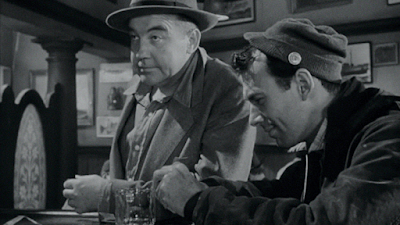This
Columbia Pictures release, directed by Robert Parish with an adapted
screenplay by William Bowers, is first-rate from beginning to end. A
compelling film about corruption, mental delusions, and atonement.
Bower’s script bounces humorous quips from one character to another
as one might expect from a film noir of this caliber. Nearly everyone
has a turn at them. The cinematography by Joseph Walker is rich with
wet streets and dark, danger-filled shadows. The well-versed George
Duning provided an effective music score, as well.
Needing to redeem his career, Crawford's acting trademark allows him to fit right in as a tough, sarcastic and unflappable thug from New Orleans. His noir quips are expelled effortlessly through his legendary lightning delivery. Also on the waterfront payroll is Richard Kiley. He and Crawford become pals. It does not take Kiley long, however, to frequently question why Crawford is so interested in what goes on. A relatively unknown Hollywood entity at this point in his career, Kiley is very authentic in this role. Crawford drops a few key names that get the attention of a Union thug, Ernest Borgnine. Neville Brand, nearly at a typecast level in his career, is again playing a henchman. This time, not the psychotic “Chester” from D.O.A. but a thug with the wherewithal to also deliver a few quips of his own.
Local
bartender, Matt Crowley, seems to know a lot about what goes on
around the waterfront. For a fee. After frequent encounters, he feels
Crawford can be trusted enough to set up a meeting with Blackie, the
kingpin. The police
put a tracking device under Crowley’s car about the size of a carry-on
suitcase. Also installed is an equally sized tank that cleverly drips
fluorescent dye on the road so the police can tail the car at night
using an infrared spotlight. Cool. Except they did not figure a city
street sweeper would turn onto their street a few blocks ahead of
them. Just one of the many clever twists in this film you will not
expect.
Blackie
wants Crawford to do him a favor. Kill the suspended police officer
seen in the newspaper. In a twist to end all twists, then, Crawford is hired to do a
hit on himself. Blackie has kidnapped
Crawford’s girlfriend, Betty Buehler, to use as a pawn to
flesh out her boyfriend, who, unknowingly, stands before him. Twisted. When
she and Crawford meet, their roles are played as effectively as possible. The
scenario becomes potentially too dangerous and Crawford tries to
overpower Blackie, who escapes with a minor gunshot wound. A hospital
setting ends the film with both Buehler and Blackie recovering.
Blackie later enters her hospital room at gunpoint while
Crawford is visiting. From an adjacent building, the police have a
clear shot through the window.
Note:
There is a humorous scene when Kiley sets up a blind date for Crawford to find out what Crawford’s game is. The
women in waiting are Kiley’s wife, played by Lynn Baggettt, and his sister,
Doris, played by Jean Alexander. Crawford immediately hooks up with
the more attractive wife. It seems no one wants to be with the sister.
Especially Kiley, who protests. He says there is nothing wrong with
Doris. “Why can’t he like Doris?!” The sister quickly adds,
“Why can’t somebody?” After numerous teasing lines between
Baggett and Crawford, the sister turns to her brother, “Well, say
something to me.” Kiley hesitates then awkwardly replies,
“Oh...uh..how ya’ been?”







